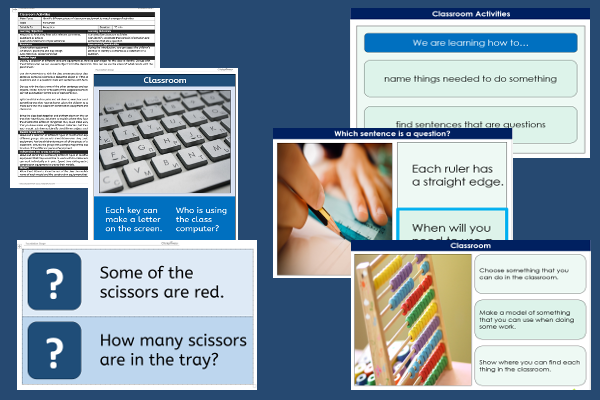Lesson Three – Classroom Activities

This curriculum topic teaching pack for the Foundation Stage gets the children to practise identifying and describing some different pieces of classroom equipment that can match a range of lesson topics and themes.
The class can differentiate and sort between example sentences that are statements or questions to find out about a selection of equipment that can be used in classroom lessons.
Download this teaching pack including a lesson plan, classroom activities and an interactive presentation to practise identifying and describing some different pieces of classroom equipment that can match a range of lesson topics and themes
Activities in this teaching pack include display posters to identify example sentences that have been written as statements or questions and a set of cards to practise grouping and matching sentences about different pieces of classroom equipment that have been written as statements or questions.
The interactive presentation gets the children to explore and describe different pieces of classroom equipment that can match a range of classroom lessons and topics.
This lesson is part of a curriculum topic scheme of work to get the children to identify the location and function of different objects used in the classroom and explore how to formulate rules to manage the classroom safely. There are teaching activities for shared learning, differentiated worksheets to support independent learning and interactive presentations to introduce concepts and key skills.
-

Garden Measurements
Practise using vocabulary words and non-standard measurements to find and compare the length of different things that can found in a garden
-

Family Holiday
Identify and recount events and experiences to describe what happened when on holiday at the seaside using sentences in the past tense
-

Money Shopping
Investigate and model some of the number skills that need to be used when working with money on a shopping trip
-

Supporting Others
Explore how to build strong and positive relationships with other pupils at school and family members at home through different situations and scenarios
